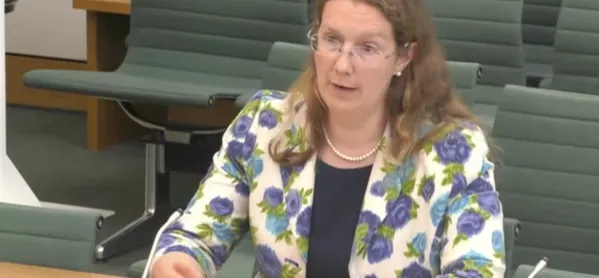The Department for Education’s top civil servant has admitted the government’s management of its Covid education recovery plan could “have been done better” after the commissioner tasked with drawing it up resigned after just four months in post.
Permanent secretary Susan Acland-Hood said that the government could have done more to ensure there was a shared set of expectations across government on what was wanted from the Covid education recovery programme.
She was questioned today by MPs on a public spending committee about the resignation of education recovery tsar Sir Kevan Collins.
Exclusive: Sir Kevan Collins resigns over catch up shortfall
Covid: No extended school day in new £1.4bn catch-up plan
Sir Kevan Collins: Learning loss compounded by catch up delay
He quit his post after his plans for a £15 billion recovery package, including extending the school day, were not fully backed by the government.
At a hearing of the Public Accounts Committee today, chair Meg Hillier MP asked what more could have done to support him and his plans.
Ms Acland-Hood said: “It’s certainly something that we’ve reflected on. I think the challenge was that he was invited by the prime minister, and by my secretary of state, to come up with radical proposals and that was what he was asked to do.
“And I think that there was a collective piece of work that we could have done better across the whole of Whitehall, to make sure that there was, at an earlier stage, a better shared set of expectations, between the parts of Whitehall, about what he was being asked to do.”
Ms Hillier asked if the government had been expecting the financial figure that Sir Kevan “had announced”.
Ms Acland-Hood said the funding numbers had been clear “relatively early in the process”.
When asked what she would do differently if she was offered a tsar appointed by the prime minister again, she replied: “The key thing that I would do differently, I think, is to ask for an earlier joint set of expectations that were widely shared across the whole system about what was being asked for from the tsar.”
Ms Hillier asked if this was something she or the education secretary Gavin Williamson should have done. Ms Acland-Hood said it was an issue across government.
The questions came after Sir Kevan said yesterday that he was “deeply disappointed” at the pace at which proposals to address lost learning among young people during the Covid pandemic were being implemented.
He told the Lords Public Services Committee: “My great concern is that people don’t quite appreciate the level of national endeavour that’s needed at the school level to do what we need to do in the next three years to recover this loss.”
The government announced a £1.4 billion package for Covid catch-up last month, with money for tutoring and career support for teachers.
However, Sir Kevan had produced more ambitious plans for a £15 billion package, which included extending the school day.
He resigned shortly after the June funding package was announced.
The government has said that it is reviewing the benefits of extending the school day to feed into decisions made in a spending review.
Last week, prime minister Boris Johnson told MPs that extending the school day was the right thing to do.
He was asked during a Commons Liaison Committee hearing what it would take for him and the Treasury to support investing in a plan that lengthened the school day.
The prime minister said: “We are looking at the evidence. If I am absolutely frank with you, some of the evidence that was assembled was not as good as it could have been.
“The evidence on timetable, on lengthening the school day, wasn’t as powerful as it was on tuition, for instance, but that doesn’t mean that it’s not the right thing to do. I do think it is the right thing to do. The question is, how you do it?
“What sort of activities? Is it academic? is it enrichment? What’s the mixture?
“We are doing a proper review of all of that to get the evidence that we want.”





